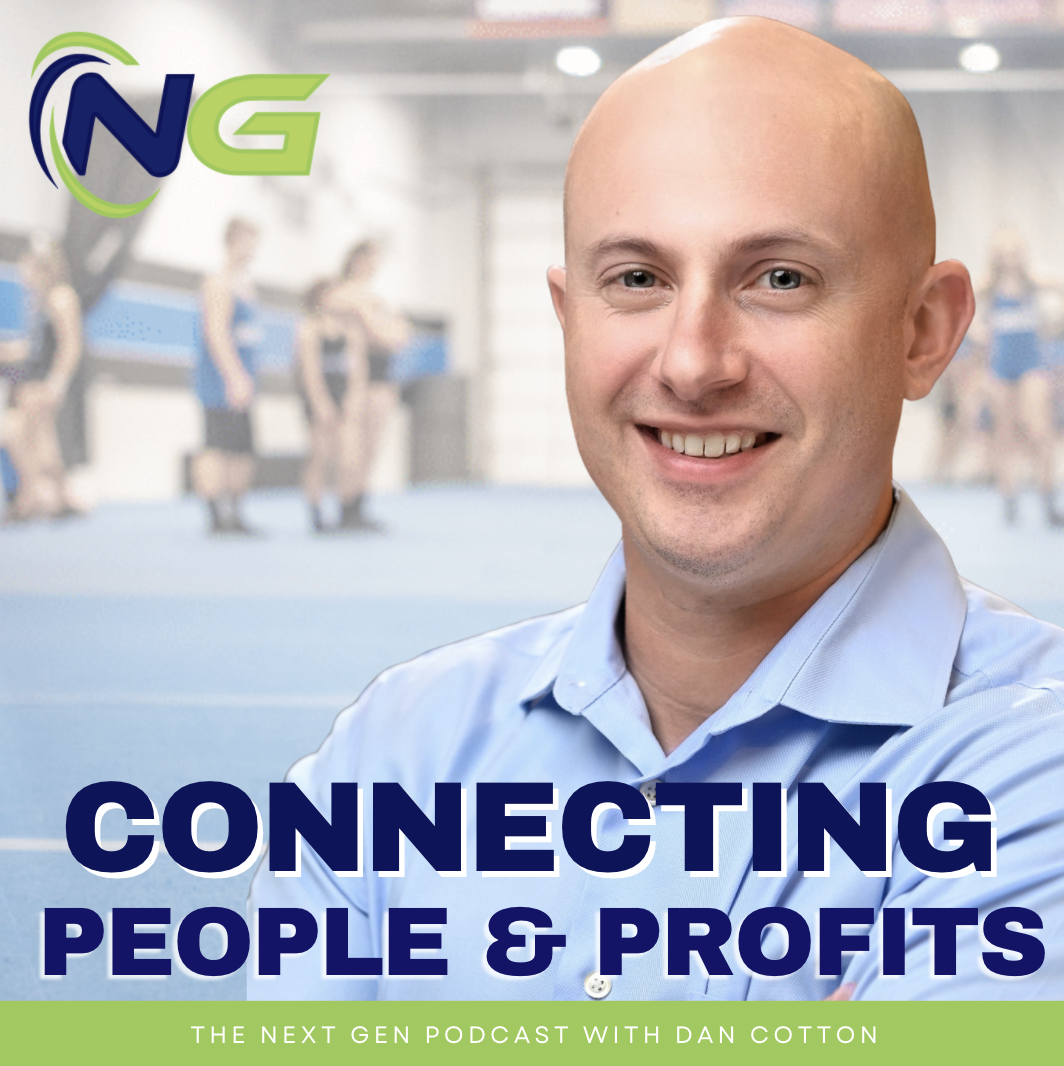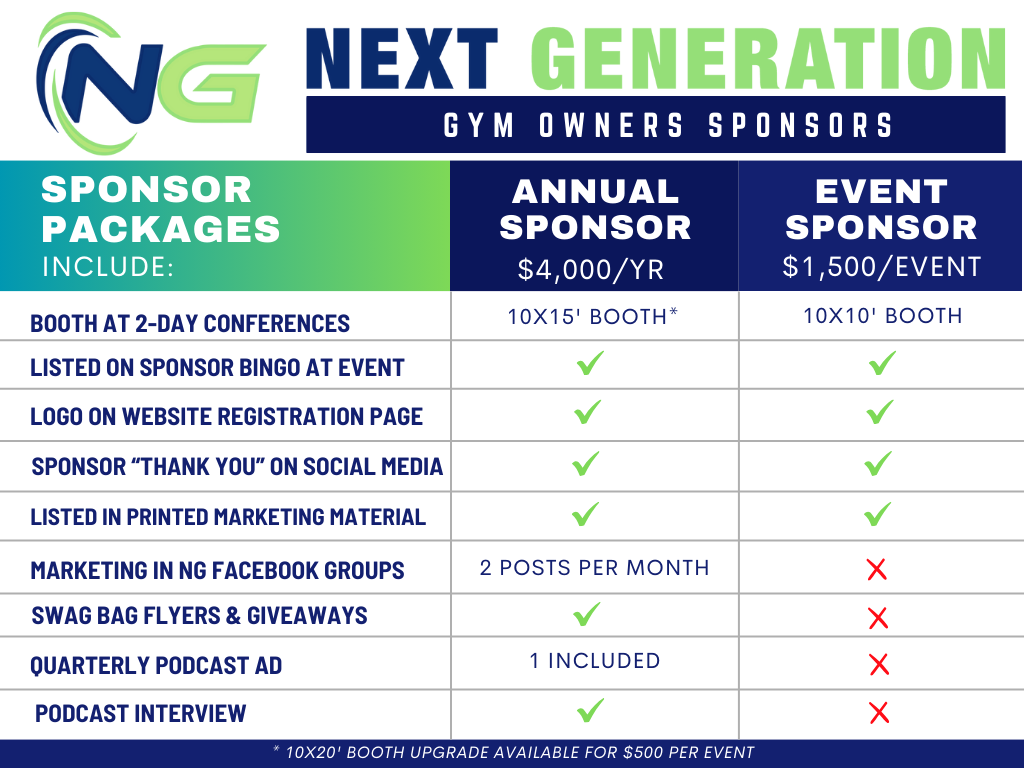Hello everyone and welcome to another episode of the next generation people and profits podcast. I’m your host, Dan cotton and I am so grateful that you joined us for this episode. Before we get going, you gotta do me a favor though. If you have not yet subscribed to the podcast, please subscribe on whatever platform you like to listen to it on. Help us grow this podcast and grow our listeners share it with someone who might get something great out of it. I know of some owners who have just been absolutely digging the content really taking advantage of the time management things that I’ve been putting out lately. We’ve had so much great content and I don’t want you to miss any of our amazing episodes that are coming out bi weekly, every week. So I don’t want you to miss it. Make sure you’re subscribed. And also if you really, really enjoy an episode, make sure that you like that. Episode because those likes and those comments that on episodes really tell us where we should focus our time and what you’re wanting to learn more about. So make sure you’re liking episodes leaving us a comment if you want to hear anything. And if you have already done those things, and you haven’t already gone over to ng Cheron gymnastics. Owners on Facebook and asked to join that group if you’re a cheer gym owner or a gymnastics gym owner, and or go to next gen owners.com And check out our website. We’ve got more great content on that as well and also information on how to join our next gen Academy.
All right, so let’s get to the episode. The All Star cheerleading industry is 100% based on competition that is literally what we do. That is the entire definition of all star cheerleading. It is a group of cheerleaders who come together to be on a team to compete competitively that is what we do. That’s the entire mission of the season, with winning being the ultimate goal. And that ends up being one of the biggest focuses of most coaches and their season. But I’m here to tell you that the reality is when it comes to having a thriving business, winning doesn’t matter. Now, that is a somewhat loaded comment, a loaded statement, and I’m gonna back it up. I have the proof to back it up. And it’s not just me this is not only anecdotal, although I’m going to give you a lot of anecdotal evidence, but winning does not matter when it comes to having a thriving and successful business. That is impacting more athletes being a positive impact on their lives, helping them and being profitable for you and your staff and building something for years to come. Now, I will tell you our least successful years competitively were some of our best in terms of retention. Number two, you are selling an experience and all star cheerleading winning is only a very, very small part of that experience. And then lastly, the reality is you can only accomplish three things and competitive cheer, and it’s what I like to refer to as the impossible triangle. So our industry promotes the best everything we do is to build competitive teams and athletes. We obsess over score sheets, we travel around country, we hire the most expensive choreographers, we pay for the most expensive best music and the best uniforms all on the off chance that each one of those little little things is going to give us a better opportunity or guarantee that we win.
We spend so much time on it. We obsess over it as a coach I obsess over it I’m always watching my routine. What can we do better? Where were we off on counts? What do I need to change about the choreography? How can we score better what can we do to improve our score? And that all comes down to the competition right? How do I win? But I’ve come to realize that those things do not always build longevity in the sport and or don’t build longevity in the sport and winning while absolutely amazing. Doesn’t even always matter. I’ve had one of the longest running worlds teams actually I have not one of I have had the longest running worlds team in the state of Oregon and the state of Oregon and Washington. We have competed in seven different divisions after this year when we compete a new division over the last 15 years. We have never won worlds. And yet we continue to have a world’s team and have continued to have a world’s team. How is that possible? If it’s all about winning and in fact, some of the years that we had the best retention and we were competing in the large co ed division. I had people tell me all the time, why are you competing large co Ed go small co Ed and win Worlds? Well, number one, there was no guarantee we would win competing small co Ed and number two my kids were happy. It was a fun division. Like okay, yes, I had to go compete against gglc and Stingray All Star steel, and we probably weren’t going to beat them unless they had a bad day. But man, I would sure love to be having that set. My tone of these are the teams that I’m competing against. I’m challenging my athletes to rise to that level to compete against teams of that caliber, and get to be in the same room as those teams then be 72nd place in a small co ed in the years when there was you know, 90 teams competing in small government. Right and not to say that that’s what we would have gotten but it’s just it was it was worth it. And the kids loved it. Our retention was so good in those years, yet we never, ever won. Now, we did win some competitions, but we didn’t win Worlds. And even then, I have had teams that have lost all season. In fact, I talked about them in another episode. But one of our flagship teams is another team that I coach and it’s our medium senior for and they’re pretty well known throughout the country, especially on the D two side. And I truly and honestly believe we produce some of the strongest level for athletes in the country. And that team is Oregon dream teams vanity you can find videos of us and we’ve had videos of we’ve had years where we were amazing. We here’s where we went cheer sport, and here’s where we did it and last year absolutely sucked. This is a team that has won potentially more times than they haven’t. And last year we didn’t win a single competition, not one and we didn’t make it to finals at Summit either for the first time ever to include the very first year we went to Summit. It was absolutely the worst year we’ve ever had in terms of competitive success.
Yet it was one of our best years of retention we have ever had. Because they had something to prove they had something to come back for and because they needed to prove that they could do better. So that struggle actually improved our ability to retain athletes. Now, we weren’t going with the goal of winning though, right? So using that team as an example isn’t even fully fair because that team did have a shot, they definitely have the talent, and we can produce the talent and we can build the routines and if I coach them correctly and hold them accountable in the right ways they should be able to compete to win. So is that even a fair example? Well, not completely. It’s a an example. But I also already mentioned my worlds team, my worlds team does not have a chance to win Worlds. Last year we competed in a small open coed division. We were one of three teams to hit zero in prelims and we did not advance to semi finals, which as a coach sucked because I was like these kids did everything I asked them to do. And they didn’t make finals. And that’s on me as a coach. But the kids were happy. They had the time of their lives. We stayed in a house together they had a pool. They absolutely loved it. They got to go to Disneyland. They got to watch more cheer at Worlds than they ever had because in the previous years we were in semifinals or finals as the case may be. And so we were so focused on competing that we missed out on the experience of being at Worlds I have had multiple athletes go on to cheer on I have had multiple app I have. Multiple athletes go on to cheer on TDLC one of the most storied teams in the United States. And they have absolutely said without equivocation that some of their best years of retention. Were years that they didn’t win Worlds and they had something to come back for they had something to work towards were in years that they did win. Oftentimes kids were like, I did it. I won. I made it. I’m gonna quit while I’m on top. Heck, I did this as an athlete in collegiate cheerleading. We won USA college nationals which was where we always competed as the University of Oregon. We won my junior year and it was the third time I messed up my back. I was in a lot of pain and I was like you know what, I’m going out on top. I’m going out on this when I don’t need to come back. I did what I wanted to do. We choreographed our own routine and we went won nationals and I’m gonna take it and I’m gonna hang up my shoes. And I did. I hung it up. That was the last time I competed on a college team. So there are a lot of different ways you can grow from grow in cheerleading and retain athletes without winning in fact, sometimes winning can be a detriment.
As I mentioned before with my worlds team, you’re selling an experience athletes in our programs. So in my program specifically with the amount of competitions we go to athletes will spend 30 minutes a season competing their routine 32 minutes and 30 seconds if they make it to summit indoor worlds, and 35 minutes if they make it to finals. That’s it that of their entire season that is what they spend competing their routine on a cheer floor. So although you spend all year preparing for competition, less than 1% Probably if you do the maths, less than point 5% of their time is spent actually competing. So the key is what is the 12 month experience? Do the kids love coming to practice? Do the athletes feel like they’re valuable members of a team? Do they feel like what they’re doing is of value so I’ve I’ve come to realize, and I mentioned this in other classes I’ve given and other other conversations I’ve had with people, but you can accomplish three things in competitive cheerleading. You can be successful, competitively successful. You can have fun, that’s the number two and you can be pushed to gain skills outside of your level and compete them. But the reality is, this is that impossible triangle. You cannot have all three at once. So you can be competitively successful and you can have fun but you’re most likely not going to be performing skills that are outside of your skill level. They’re going to be skills that you have mastered. You can have fun and you can be pushed to gain skills outside of your level and compete them but you’re most likely not going to be competitively successful. And you can be competitively successful and you can be pushed to throw skills that you didn’t have at the beginning of the season mastered but the likelihood is you’re not going to have a lot of fun because your coaches are going to be having to be in your face all the time pushing you pushing you outside your comfort zone beyond what you even think is capable having extra practices and it’s just not going to be an enjoyable experience. So you have to as a as a program and as a coach, decide where you want your athletes to be.
Running a successful All Star program isn’t easy. In fact it is very, very difficult. On top of running all the things that your business you’re also trying to figure out how to make all star experience that kids love they feel successful in and they want to participate in and that is a lot to try to accomplish. Now we as next gen put together our All Star Academy packets that can help you run a good All Star Program and not just run a good one but also thrive while you’re doing it. So check those out there on our website. You can purchase one packet or you can purchase all the packets but they are very, very helpful and they can really help you take your All Star program to another level. Now everyone has heard the adage that winning isn’t everything. The number of programs that have won summit one world one NCAA and then close their doors within a year or two would shock you. I have friends who cheered at and or owned programs. Know that they found a two year program. They went when worlds came back their gym didn’t exist after the time their plane landed. They know someone sold and went to another gym and was bought by another big name gym and that gym folded. Winning is not the be all end all. You can win things and no longer exist as a business. Winning is great. It’s fun, and I love doing it. I am incredibly competitive. But it is not what matters when it comes to growing your business. Is it great? Yeah. Does it help? Sure. Our kids going to travel to be on great teams. Yes. But those are the few and far between. It’s you don’t have to win to have a large number of athletes. There is a local program in Oregon that I absolutely respect their business because they realized early on that those are the few and far travel to be on great teams. Yes. But those are the few and far between. It’s you don’t have to win to have a large number of athletes. There is a local program in Oregon that I absolutely respect their business because they realized early on that not early on they realized at a point in time. That they were not going to be competitive trying to feel the world’s team they went through some ownership changes. I don’t want to go into detail on all of that. Because I don’t want to say anything negative about anyone involved in the process. But they decided you know what we’re going to focus on level three and below and in fact, we’re going to focus on having a really great level one and level one prep program. I swear I don’t know what their numbers are this year, but this program routinely has 100 Plus kids competing level one prep.
Do you know how impossible it is for me in the state of Oregon to have 100 kids in my worlds program. It’s not going to happen not anytime soon. Unless I home grow it it’s going to take decades to do. We’re not California we don’t have that many cheerleaders. Now we could get there eventually but we just don’t have that. But there are literally endless level ones endless. There are way more beginners than there are advanced athletes. I tell my camp staff this all the time because teams come to camp that aren’t good. And my staff is like I hate working with these unathletic kids well guess what? There’s a lot more unathletic people who want to learn from you who can because you’re really athletic. Then there are really athletic people that want to pay money to learn from you because you’re really athletic. It’s just it’s a it’s a harder demographic. You those low levels that are not worried about winning that are there for the experience, they just want to get better and be a part of something bigger, are far better for your business than any world’s team, or elite summit team. So as you leave this episode, I want you to look at what you’re focusing on in your program and what your coaches are focusing on are they solely focused on the wind or do they understand that the wind is just a nice cherry on top of what should be an amazing season for your athletes? Now, I’m nothing I’m saying is saying that you shouldn’t be focused on your athletes being able to go out and hit a good routine. And be feel successful.
But winning the competition is up to the judges. Now. There’s a lot of things we can do to help win and I again, I’m very competitive, don’t take anything from this. But winning is not everything and it is actually does not help you grow your business long. term. Because winning isn’t sustainable. Every team is going to lose at some point in time. And if your entire identity is built around winning, you’re on shaky ground because eventually you’re going to lose. Alright, I hope you enjoyed this episode. If you want to listen to another great podcast, make sure you check out the let’s talk to your podcast with Jason Larkins. I was lucky enough to do an interview with Jason. Just last week. It will be airing in a couple of weeks and we will post it on this podcast as well. We’ll probably do a two parter because it was a pretty long interview.












